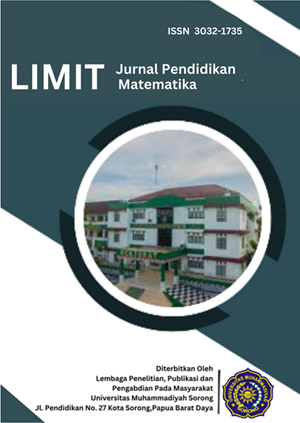Pembelajaran Dan Matematika: Hasil Kajian Literatur
Keywords:
Bibliomatrik, Mathematics, Teaching, Teaching ClassAbstract
Abstrak
Penelitian dalam berkaitan dengan pembelajaran matematika telah mengungkapkan berbagai dimensi penting yang berkaitan dengan bagaimana matematika diajarkan oleh guru dan dapat diterima oleh siswa. Fokus utama penelitian ini adalah untuk mengkaji berbagai faktor yang mempengaruhi sikap positif terhadap pembelajaran matematika yang melibatkan aspek emosional dan psikologis, serta mengintegrasikan pendekatan didaktik modern untuk meningkatkan kreativitas dan minat siswa. Penelitian ini mengkaji kumpulan artikel ilmiah yang membahas tentang tren penelitian yang berkaitan dengan pembelajaran matematika yang dipublikasikan pada jurnal internasional bereputasi. Hasil penelitian dapat disimpulkan bahwa selama 5 tahun terakhir dari tahun 2019 sampai 2022 terdapat tren peningkatan dalam jumlah publikasi. Peningkatan yang konsisten dari tahun 2019 hingga 2022 mencerminkan pertumbuhan terus-menerus dalam penelitian pendidikan matematika atau efek dari meningkatnya publikasi akses terbuka. Meningkatnya tren publikasi yang terbanyak pada kategori Education dengan total 3.423 publikasi, kategori pendidikan adalah yang terbesar menunjukkan bahwa ada banyak penelitian yang dilakukan dalam bidang pendidikan yang terkait dengan pembelajaran dan matematika. Temuan hasil penelitian juga dapat dijabarkan bahwa pendekatan yang mempertimbangkan faktor emosional, estetika, dan praktik didaktik modern dapat secara signifikan meningkatkan minat dan kreativitas siswa dalam belajar matematika.
Abstract
Research in math learning has revealed a range of important dimensions relating to how math is taught by teachers and acceptable to students. The main focus of this study is to examine various factors that influence positive attitudes towards mathematics learning involving emotional and psychological aspects, as well as integrate modern didactic approaches to increase students' creativity and interest. This study examines a collection of scientific articles that discuss research trends related to mathematics learning published in reputable international journals. The study results can be concluded that during the last 5 years, from 2019 to 2022, there has been an increasing trend in the number of publications. The consistent increase from 2019 to 2022 reflects continued growth in mathematics education research or the effects of increased open-access publications. The increasing trend of publications is the highest in the Education category, with a total of 3,423 publications; the education category is the largest, showing that there is a lot of research done in the field of education related to learning and mathematics. The findings of the research results can also be elaborated on. Namely, approaches considering emotional, aesthetic, and modern didactic practices can significantly increase students' interest and creativity in mathematics.
References
Abah, J. (2020). An Appeal in the Case involving Conventional Teaching: Emphasizing the Transformation to Enhanced Conventional Teaching in Mathematics Education. VillageMath Educational Review (VER), 1(1), 1–10. https://doi.org/10.5281/zenodo.3860320
Burton, H., & Stewart, I. (2021). Teaching Mathematics. Conversations About Anthropology & Sociology. https://doi.org/10.2307/j.ctv22jnm0h.14.
Capaldi, M. (Ed.). (2021). Teaching Mathematics Through Games (Vol. 65). American Mathematical Soc..2
Chao, T., Maldonado, L. A., Kalinec-Craig, C., & Celedón-Pattichis, S. (2019). Preparing Pre-Service Elementary Mathematics Teachers to Critically Engage in Elementary Mathematics Methods. Transforming Mathematics Teacher Education: An Equity-Based Approach, 147-160.
Cevikbas, M., & Kaiser, G. (2020). Flipped classroom as a reform-oriented approach to teaching mathematics. Zdm, 1 - 15. https://doi.org/10.1007/s11858-020-01191-5.
Delgado-Rebolledo, R., & Zakaryan, D. (2020). Relationships between the knowledge of practices in mathematics and the pedagogical content knowledge of a mathematics lecturer. International Journal of Science and Mathematics Education, 18, 567-587.
Fu, X. (2019). Truth, goodness and beauty in mathematics teaching. Journal of Innovative Technology and Education, 6(1), 25–29. https://doi.org/10.12988/jite.2019.984
Greenstein, S., & Russo, M. (2019). Teaching for Social Justice through Critical Mathematical Inquiry. Occasional Paper Series, 2019(41). https://doi.org/10.58295/2375-3668.1300
Jankvist, U. T., Clark, K. M., & Mosvold, R. (2020). Developing mathematical knowledge for teaching teachers: Potentials of history of mathematics in teacher educator training. Journal of Mathematics Teacher Education, 23(3), 311-332.
Jovanović, I., & Vulović, N. (2021). Uočavanje zakonitosti i pravila u početnoj nastavi matematike. Узданица, 18(1), 325–338. https://doi.org/10.46793/uzdanica18.1.325j
Khamidova, M. P. (2021). Development of Collective Activity of Specialized Assistant School Students on the Basis of Didactic Games in Mathematics. Current Research Journal of Pedagogics, 02(11), 134–137. https://doi.org/10.37547/pedagogics-crjp-02-11-25
Marbán, J. M., Palacios, A., & Maroto, A. (2021). Enjoyment of teaching mathematics among pre-service teachers. Mathematics Education Research Journal, 33(3), 613-629.
Miller, R. S., & Wang, M. T. (2019). Cultivating adolescents’ academic identity: Ascertaining the mediating effects of motivational beliefs between classroom practices and mathematics identity. Journal of Youth and Adolescence, 48, 2038-2050.
Nikolić, S., & Hilčenko, S. (2022). Learning Mathematics Through the Modern Didactic Principle of Polyformity. Journal of Education, Technology and Computer Science, 33(3), 35-45.
Nurhayati, Palobo, M., Nur’aini, K. D., Natsir, I., Meirista, E., & Munfarikhatin, A. (2020). Implementation of software geogebra on triangles. Journal of Physics: Conference Series, 1569(4). https://doi.org/10.1088/1742-6596/1569/4/042068
Phelps, G., Howell, H., & Liu, S. (2020). Exploring differences in mathematical knowledge for teaching for prospective and practicing teachers. ZDM, 52, 255-268.
Saclarides, E., Garner, B., Krause, G., Bertolone-Smith, C., & Munson, J. (2022). Design Principles That Support Course Design Innovation for Elementary Mathematics Methods Courses. Mathematics Teacher Educator. https://doi.org/10.5951/mte.2020.0081.
Setyo, A. A., Pomalato, S. W., Hulukati, E. P., Machmud, T., & Djafri, N. (2023). Effectiveness of TPACK-Based Multimodal Digital Teaching Materials for Mathematical Critical Thinking Ability. International Journal of Information and Education Technology, 13(10), 1604-1608.
Ungureanu, L. (2020). Teaching Mathematics-Online versus Offline. Journal of Research in Educational Sciences (JRES), 11(13), 30-35.
Viesca, K. M., Joseph, N. M., & Commins, N. L. (2019). A framework for improving the teaching of mathematics to bi/multilingual learners. Teaching the Content Areas to English Language Learners in Secondary Schools: English Language Arts, Mathematics,
Xu, X. (2021). The Application of Computer Network Technology in Mathematics Teaching. In 2020 International Conference on Applications and Techniques in Cyber Intelligence: Applications and Techniques in Cyber Intelligence (ATCI 2020) (pp. 145-152). Springer International Publishing.
Downloads
Published
How to Cite
Issue
Section
License
Copyright (c) 2024 rya andini, Regina Phricilia, wa ode riski, karim paul arongggear, siti aisa bugis, yulianti sira'an

This work is licensed under a Creative Commons Attribution-ShareAlike 4.0 International License.





